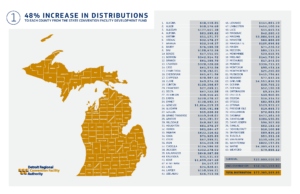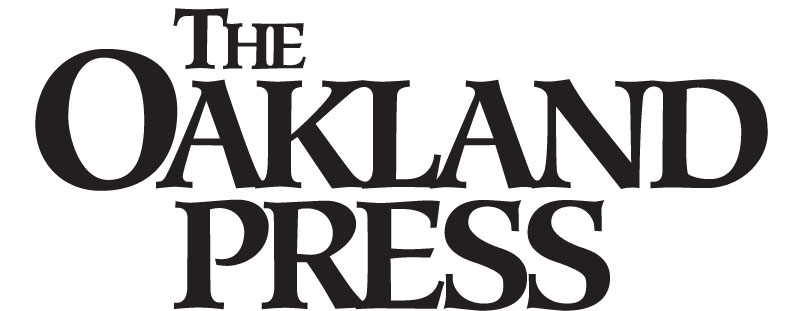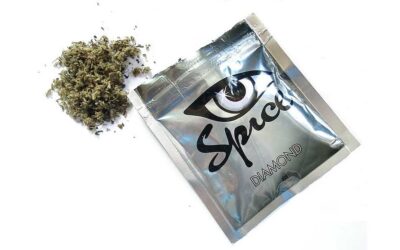Adult-Use Marijuana Tax Payments Being Distributed In Michigan
Here’s what they say…
Treasury: Adult-Use Marijuana Payments Being Distributed to Michigan Municipalities and Counties; More Than $59.5 Million Going to 224 Municipalities and Counties.
Sales of “legal” marijuana in Michigan contributed $266.2 million in tax revenue to the government during the most recent fiscal year, according to a new report from the legislature’s nonpartisan House Fiscal Agency.
That’s more than the state made from the sale of beer, wine and liquor combined.
February 28, 2023
The Michigan Department of Treasury today announced that more than $59.5 million is being distributed among 224 municipalities and counties as a part of the Michigan Regulation and Taxation of Marijuana Act.
Over the next few days, 81 cities, 26 villages, 53 townships and 64 counties will receive payments from the Marihuana Regulation Fund. For the state of Michigan’s 2022 fiscal year, this means each eligible municipality and county will receive more than $51,800 for every licensed retail store and microbusiness located within its jurisdiction.
“Municipalities and counties will begin seeing these payments appear in their banking accounts,” State Treasurer Rachael Eubanks said. “Through a partnership, the dollars received from the adult-use marijuana taxes and fees are distributed to our participating communities.”
Revenue was collected from 574 licensees among the state’s cities, villages and townships during the 2022 fiscal year. Some of these municipalities host more than one licensed retail store and microbusiness.
For the 2022 state fiscal year, there was $198.4 million available for distribution from the Marihuana Regulation Fund.
State law outlines how much is distributed from the Marihuana Regulation Fund.
Aside from the more than $59.5 million in disbursements to municipalities and counties, $69.4 million was sent to the School Aid Fund for K-12 education and another $69.4 million to the Michigan Transportation Fund.
In total, more than $1.8 billion in adult-use marijuana sales was reported for Fiscal Year 2022.
“The team at the CRA does an amazing job and our effective regulatory approach allows our licensees to provide Michigan’s cannabis consumers the safest possible product,” said CRA Executive Director Brian Hanna. “The funding that makes its way to local governments through the excise tax collected by licensed retailers is an important benefit of the regulated cannabis industry and the CRA is committed to doing our part in supporting our law-abiding licensees.”
Where they say the money goes…
Adult-Use (Recreational) Marijuana
Adult Use Break Downs
$226m – $59m = $167m (left over after distribution…nice haul)
Marijuana funds collected under the Michigan Regulation and Taxation of Marihuana Act (Initiated Law 1 of 2018) are distributed, upon appropriation, as follows:
- 15% to municipalities in which a marijuana retail store or a marijuana microbusiness is located, allocated in proportion to the number of marijuana retail stores and marijuana microbusinesses within the municipality.
- 15% to counties in which a marijuana retail store or a marijuana microbusiness is located, allocated in proportion to the number of marijuana retail stores and marijuana microbusinesses within the county.
- 35% to the School Aid Fund to be used for K-12 education.
- 35% to the Michigan Transportation Fund to be used for the repair and maintenance of roads and bridges.
Links
MEDICAL Marijuana Break Downs
For more information about adult-use marijuana tax distributions – including a breakdown of how much municipalities and counties received – go to Michigan.gov/RevenueSharing. To learn more about Michigan’s adult-use marijuana industry, go to Michigan.gov/cra.
Source: https://www.michigan.gov/treasury/news/2023/02/28/adult-use-marijuana-payments-being–distributed-to-michigan-municipalities-and-counties
Have your rights been violated?
Have your driving priviledges been revoked?
Has your professional license been suspended?
Second Amendment rights taken away?
Have you been charged with a crime?
Call our office to see if we can help
Komorn Law 248-357-2550
More is always better for the Government
Legislative Update 12-9-22
Liquor tax funding change means $25 million boost to counties
 A two-bill package designed to extend the capture of liquor tax revenue that counties use for substance abuse programs passed during the last days of the legislative session this week and will soon mean a $25 million boost to counties.
A two-bill package designed to extend the capture of liquor tax revenue that counties use for substance abuse programs passed during the last days of the legislative session this week and will soon mean a $25 million boost to counties.
Senate Bills 1222-23, by Sen Wayne Schmidt (R-Grand Traverse), amend the State Convention Facilities Authority Act to extend the sunset on the capture of liquor tax revenue for improvements to the convention facility in Detroit and therefore extend the sunset on the collection of liquor tax revenue for counties.
The issues were tied together when the act was created. Under current law, the collection and allocation of the liquor tax revenue expires once the bonds for the convention facility are paid off. Due to recent increases in liquor tax revenue, those bonds are scheduled to be paid off 13 years early, which would eliminate the future collection of revenue and deplete the allocation to counties. This two-bill package does not extend the 2039 deadline for the bonds to be paid off, but it does allow the facility authority to issue additional bonds for improvements.
MAC has been working with representatives from the authority to address our need to have counties’ annual allocation reflective of the collection of the liquor tax revenue. Current law states counties receive an increase in their allocation based on a percentage above the previous year’s allocation, not on a percentage of the total tax collected. The excess tax collected is instead allocated to the reduction of the bond debt of the authority. (Again, due to the increase in liquor tax revenue, those bonds are scheduled to be paid off early.)
By allowing the authority to issue additional debt for improvements, the bills do something significant for counties. Beginning in 2023, the baseline allocation in liquor tax dollars for counties will increase by approximately 48 percent — or $25 million. (See county-by-county estimates.) The annual increase will remain the same as current law of 1 percent additional each year, but the baseline will be reset every three years to reflect the increase in revenue from the liquor tax.
Also, current law states 50 percent of the liquor tax revenue received by counties must be allocated to substance abuse programs. SBs 1222-23 will change that requirement to 40 percent (though no less than the amount allocated in FY22). In short, this will be a significant increase in funds toward substance abuse programs and an increase in the amount counties can allocate to their general funds.
The bills are now headed to the governor for her expected signature.
For more information on this issue, contact Deena Bosworth at bosworth@micounties.org.

Related Articles
No Results Found
The page you requested could not be found. Try refining your search, or use the navigation above to locate the post.
More Posts

Komorn AVVO Reviews
Research no further, call Komorn. 5.0 stars Posted by a client December 31, 2015 Hired attorney After an incident involving my medical marihuana grow, I found myself being charged with 2 manufacturing felonies. Upon a recommendation from an associate, I retained...

Criminal Defense Attorney of Michigan Award Committee
The Criminal Defense Attorney of Michigan’s Award Committee has selected Michael J. Komorn as the recipient of their Right to Counsel Award. This award recognizes the amazing contributions of a group or individual in the form of legal representation or other...

Judge dismissed felony charge against medical marijuana patient Max Lorincz
OTTAWA COUNTY, Mich. – After 16 months of a criminal and family court battle, an Ottawa County Circuit Court Judge dismissed wrongful felony charges against a Spring Lake father and card-carrying medical marijuana patient for having “synthetic THC.” Friday Max...

Southfield attorneys accuse MSP Crime Lab of negligence and incompetence
Two local attorneys have filed a formal complaint against the Michigan State Police Crime Lab, suggesting the agency should be made into an independent entity, but state officials have refuted the accusations of negligence and incompetence. Southfield-based...

Forensic scientists blast State Police crime lab THC policy as man fights to get son back
Maxwell Lorincz lives in Spring Lake near Lake Michigan with his wife and their six-year-old son. At least, they did live with their son, until a year and a half ago. They lost custody of him after Lorincz was charged with a felony for possessing synthetic THC....

People v Redden & Clark – MI Medical Marijuana hearing – February 20 2013
During this February 20, 2013 hearing, Assistant Oakland County Prosecutor Beth Hand notified the court that her office is contemplating filing criminal charges against a medical doctor for his involvement in certifying two medical marijuana patients, Robert Redden...

Medical marijuana lawyers want state crime lab moved out of Michigan State Police
"The attorneys claim the policy change is leading to unfair felony charges for patients who would otherwise face misdemeanors." Posted on MichiganRadio.org A group of criminal defense attorneys says the Michigan State Police (MSP) should no longer...

Defense attorneys seek fed inquiry of MSP crime labs
Southfield — Three defense attorneys are asking the federal government to investigate the Michigan State Police crime laboratories, alleging misconduct in their testing for pending drug cases. Southfield defense attorneys Neil Rockind and Michael Komorn, along...

MI Cops Change Policy So They Can Falsely Imprison Legal Pot Smokers
In 2008, an overwhelming majority of Michigan voters approved legislation to legalize marijuana for medical use in the state. With nearly 50,000 Michigan residents arrested and incarcerated each year for controlled substance violations, the state’s prison industrial...

Attorney Alleges Authorities `Bend The Science’ To Elevate Marijuana Cases
MIRS-Michigan Independent Source Of News and Information Friday Nov 6, 2015 Maxwell LORINCZ, of Spring Lake, says a fingerprint of oil on an empty plastic container led to his arrest on a drug charge on Sept. 24, 2014. Now, a year later, the case that might have...








